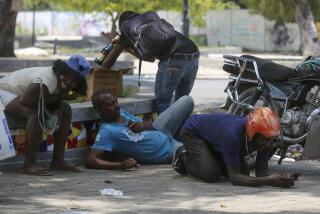Talks Fail to Resolve Haiti’s Political Crisis : Diplomacy: Issues of Aristide’s return, lifting of sanctions block accord.
- Share via
CARTAGENA, Colombia — Talks between deposed Haitian President Jean-Bertrand Aristide and members of a government delegation to resolve Haiti’s political crisis failed Sunday over the central issues of Aristide’s return to power and a call for lifting of international economic sanctions against that country.
One representative of the Organization of American States, which sponsored the talks and watched over them here, said the failure was really the result of the government delegates’ fears both of the country’s military rulers and of Aristide’s overwhelming support inside the country.
“It’s the same problem as always because (the delegates) are either afraid of the military or want to hold on to power,” he said.
Other OAS representatives, while calling the failure to reach an agreement “lamentable,” did not rule out further talks to try to solve the Haitian crisis. The crisis was provoked when the army seized power Sept. 30, sending Aristide, the first Haitian chief of state to be elevated by authentically democratic elections, into exile after only seven months in office.
“Lamentably, it has not been possible to obtain the full agreement (of the two sides),” said Augusto Ramirez, head of the OAS observer body. “A new meeting with a set time and place is not planned. But efforts should continue.”
The conversations ran aground on the wording of a draft document of negotiating points for continued talks between the two sides.
Ramirez said the parties failed to agree on two points: Aristide’s insistence that he be named as Haiti’s legitimate president in any agreement and his refusal to call for lifting of the economic sanctions without simultaneously being allowed to form a new government in consultation with congressional leaders.
In a declaration, Aristide repeated his demand that he be allowed to return to Haiti as the legitimate head of state. The government delegates--all members of the Haitian National Assembly that is now under the thumb of the army--wanted more ambiguous language in the negotiating paper.
The delegation insisted that the document refer only to a constitutional article setting a five-year presidential term and to OAS resolutions calling for Aristide’s restitution.
“(Aristide) wanted us to mention him by name as president and we couldn’t do that,” said Thomas Eddy Dupiton, a Haitian senator, explaining that the move would put the Assembly in the awkward position of recognizing two heads of state.
After Aristide’s ouster, the legislature named Joseph Nerette, 67, president of the Supreme Court, as Haiti’s new president. Nerette was named after soldiers stormed the legislative palace and forced the vote at gunpoint.
“You must remember that these (delegates) are the people who named the de facto president,” said one observer at the Cartagena talks. “It’s very difficult for them to now go back and say ‘sorry, we made a mistake.’ ”
Other observers said the Haitian delegation, by standing tough on the issue, was apparently following implicit instructions of the army.
The delegation of eight Assembly members and the de facto government’s foreign secretary persisted in focusing on efforts to achieve the lifting of the sanctions that were imposed on Haiti by the United States, the OAS and other members of the international community after Aristide’s ouster.
“The military is acting exactly like Saddam Hussein by sending proxies to try to lift the embargo without making any concessions,” said Frantz Voldair, a Haitian political science professor attending the talks as an observer. “They are trying to gain time.”
Dupiton also suggested that he and others had little real ability to negotiate an agreement with Aristide.
“We want to play the role of facilitators of dialogue between Aristide and all other parties, including the military,” said Dupiton, one of two government representatives on a six-member committee that worked on the draft negotiating document until the wee hours Sunday morning.
The committee also included two of Aristide’s representatives and two OAS representatives.
The OAS delegation said Sunday morning that the committee had produced a working document, which included a clause calling for Aristide’s return.
Other goals that were to be outlined in the draft paper were the modernization of Haiti’s military, creation of a national police force independent of the military and the lifting of the trade embargo.
Those points were never disputed in committee, Ramirez said. But the agreement began to unravel when several other Haitian delegates objected to the article on Aristide’s return.
Voldair, who teaches at the University of Quebec, accused the delegates of “accepting the fiction” that Haiti’s crisis can be solved without the return of Aristide, still hugely popular among the poorest citizens of Latin America’s poorest country.
More to Read
Sign up for Essential California
The most important California stories and recommendations in your inbox every morning.
You may occasionally receive promotional content from the Los Angeles Times.













